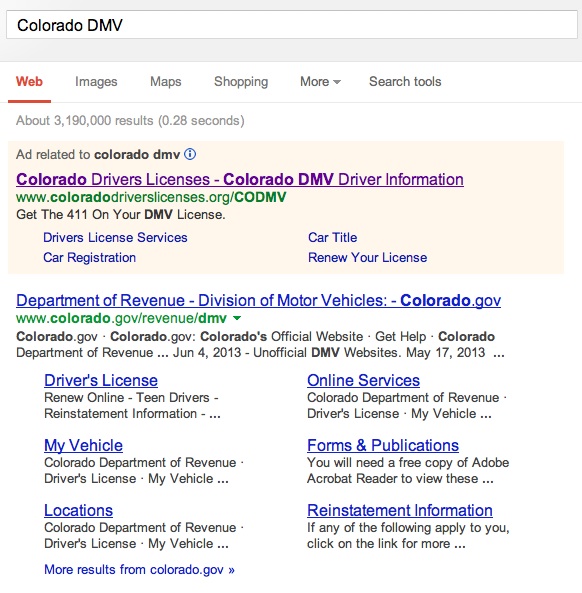A fool and his $14 are soon parted.
Even more money than that, if the fool is taken in by some of the other half-dozen Web sites that prey upon those who try to take advantage of the relatively recent opportunity to renew Colorado drivers’ licenses online.
The sites ask all the right questions, leading you down their primrose path until you put down your credit card number — then suddenly discover you’ve got no license, just information that the state would have given you for free.
Attorney General John Suthers blames Google for this and other online scams, and he’s at least partly right.
![]() Perhaps the fools taken in — all right, I confess to being one of them — are being punished for not going first to the local DMV, taking a number and sitting around for hours as God and the bureaucracy intended.
Perhaps the fools taken in — all right, I confess to being one of them — are being punished for not going first to the local DMV, taking a number and sitting around for hours as God and the bureaucracy intended.
Natriece Bryant is the designated flak catcher for the Colorado Revenue Department on this issue. They give her business card out at DMV offices to all those who complain about paying $14 or more to a bogus Web site and still have to come down and pay $21 more to the state for a real license.
Her first tip when you call: Make sure that colorado.gov is on the Web site you work with. The scammers use .org and .com.
But some people must assume that nobody would dare simulate a state Web site. After all, wouldn’t the state come down on them like ton of too-big ammunition clips?

No, it wouldn’t. That’s because the bogus sites — Bryant estimates there are at least five or six — include disclaimers in tiny type, usually at the bottom, saying they’re not affiliated with any state agency etc.
The state isn’t going to give you back your money and can’t even prosecute the sites, which are said to be located out of state.
Bryant said the department learned about the scam in March from drivers “who paid $14 to get PDF files that told them how to do stuff that was free.”
The Revenue Department has sent out news releases and public service announcements to the media warning about the scam, but publicity has been limited.
Channel 9 did report that at one DMV location in Littleton, 15 people came in in a single day wondering why they hadn’t received their new driver’s license.
There’s no evidence to date that the online scammers use your credit card for other purposes, said Bryant, “but I tell people to be safe, cancel their card and get a new one.”
If your card was used later for other purposes then it would be fraud and the scam sites could be prosecuted.
“The real devil here is Google,” said AG Suthers, a comforting thought for those of us looking to blame something other than our own stupidity. “A series of choices comes up according to how much Google is getting paid.”
Suthers recently returned from a national conference of attorneys general at which Google, the world’s most popular search engine, played the villain. “I’ve never seen a company get rapped so hard,” he said.
There are practically no legal remedies, he maintained, thanks to congressional legislation that keeps hands off the Internet. “They are flexing their 80 percent market share in a very irresponsible way.”
More upsetting to him than low-rent scams like fake driver’s license sites are the “prescription drugs without a prescription” that Google markets. At his recent conference there was a demonstration in which a 15-year-old communicated with a site, told them his real age, admitted not having a prescription or even a credit card, and was still able to score a drug.
Suthers recalled an incident about 18 months ago when executives from Rosetta Stone, a language-learning firm which has offices in Boulder, came to him to complain that when they Googled their own company, it came up seventh on the list, behind six outfits that were paying Google to get priority sites.
“They said it took an average of three months to take them down, and it took an average of two days to get re-posted afterward,” Suthers maintained. (My own test indicates that this problem has apparently been solved.)
Suthers, to his credit, didn’t insist that the solution was federal legislation controlling Google and other Internet miscreants. He sides with two professors he heard lecture at the conference who argued that the answer was not regulation but more competition for Google.
“If they were competing for this business it would be a different story,” Suthers maintained.
I want that to be true. But I just used a Google competitor, Microsoft’s Bing, to find out how to renew my driver’s license on line, and it produced four bogus sites ahead of a real one. Google, this time, produced only one bogus site first. Apparently Bing wants to get big by behaving like Google.
In any case,if you feel as though you’ve been scammed, Suthers invites you to call his consumer protection hotline, 1-800-222-4444.
Longtime Rocky Mountain News political columnist Peter Blake now writes Thursdays for CompleteColorado.com. Contact him at pblake0705@comcast.net You may re-publish his work at no charge and without further permission; please give full credit to Peter Blake and www.CompleteColorado.com


